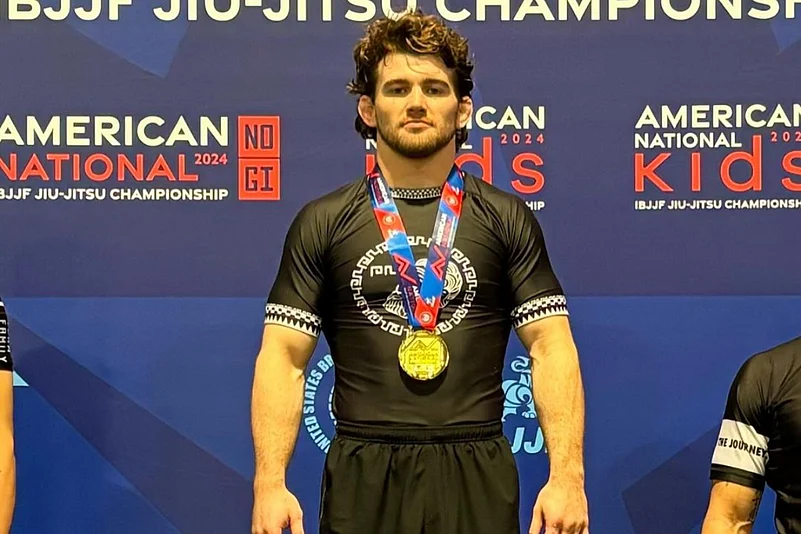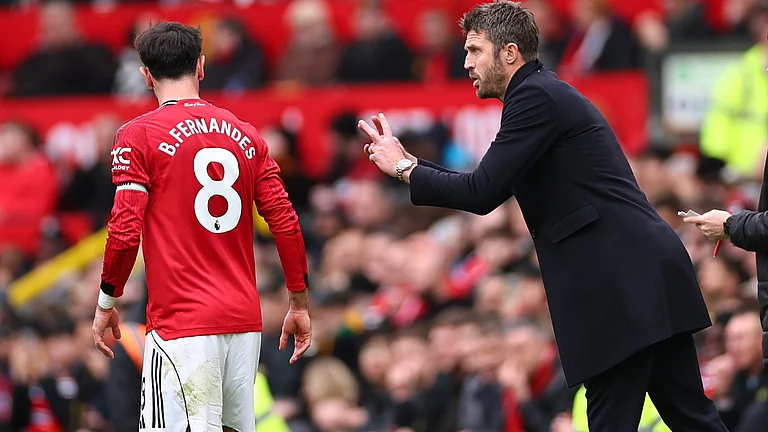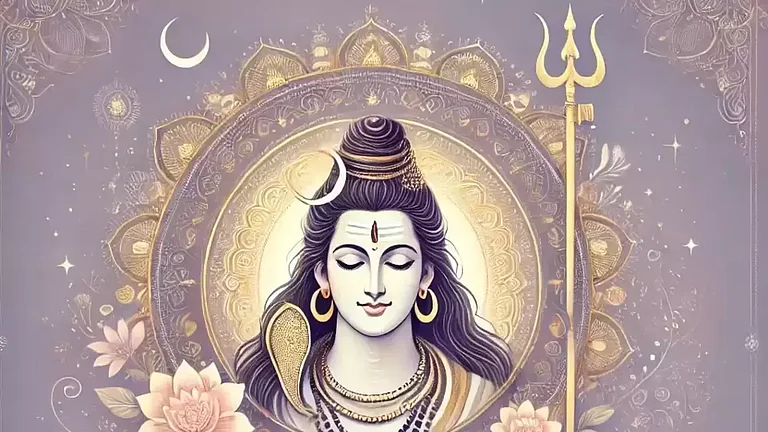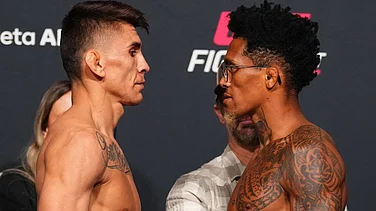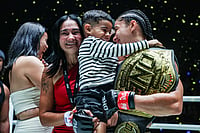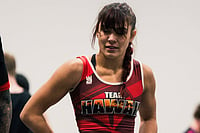Decorated Brazilian Jiu-Jitsu black belt Dante Leon has spent the past several years solidifying himself as one of the sport’s top pound-for-pound athletes – and he’s now bringing his talents to the world’s largest martial arts organization.
On December 6, live in U.S. primetime at ONE Fight Night 26: Lee vs. Rasulov on Prime Video, the Canadian powerhouse will make his promotional debut when he squares off with fellow BJJ black belt Bruno “Puccibull” Pucci in a lightweight submission grappling tilt at Lumpinee Stadium in Bangkok, Thailand.
Already a multiple-time IBJJF No-Gi World Champion renowned for his accomplishments across multiple weight classes, Leon could become a certified global superstar in ONE.
However, things weren’t always easy for the 29-year-old. Here, we recount Leon’s winding road to the top of the submission grappling world.
Leaving Hockey For BJJ
Leon grew up outside of Windsor, Canada, just across the border from Detroit, United States.
Like many other Canadian kids, he played hockey. But while he enjoyed the physical nature of the game, his interest in the sport was waning around the same time that he discovered BJJ.
Before long, he left the ice for good in favor of the mats. He told onefc.com:
“It was almost like my desire for hockey was kind of leaving. I really liked the game, but I was kind of losing my passion to be super competitive with it. At that point, I actually found jiu-jitsu with the help of my dad. He introduced me to it.
“When I started [with BJJ], I played hockey for about another 6 months, and then I stopped, and I’ve never played hockey since. So, since I was 12-and-a-half years old, I have not laced up a pair of skates or anything like that.”
From the beginning, Leon had an innate knack for the grappling-based martial art.
Of course, being good at BJJ made it more enjoyable, but it was the rough-and-tumble physicality of the sport that drew him in:
“I enjoyed the kind of problem-solving side of things and the physicality of it. It was something that I wouldn’t get in trouble for.
“I could be rough, but not, like, punching people and hurting people necessarily. It was a way to check off a lot of boxes that a lot a lot of other sports didn’t.”
‘I Just Fell In Love With Competing’
After about 10 months of training, the young Canadian jumped into his first tournament. He already liked BJJ, but this was a new type of thrill that hooked him for good:
“I just fell in love with competing. I fell in love with the environment, with the idea of competing, with the the unknown, the challenge of competing.”
Leon quickly became addicted to training and competing – and soon established himself as one of the world’s top teenage BJJ athletes.
As a juvenile blue belt competitor, he won IBJJF World and Pan-American Titles and even conquered a major IBJJF tournament in the adult division at just 16 years old.
Ultimately, a 2013 gold medal performance at the IBJJF Pan-American Championships convinced Leon that he could pursue BJJ as a full-time career. However, he still needed to convince his parents.
With some stipulations attached, they agreed to go all-in on BJJ and allow their son to chase his dreams:
“Once I won Pans, it was almost like I made my case. I made my plea. And my parents, they had their rules and their standards about, you know, it has to be school [first], and you can’t slack off. You can’t be a terrible student in the programs you don’t like. You might have to pull up your socks a little bit.
“But, honestly, they were supportive. And when I look back, I think they took it very well.”
Growing Pains At Purple Belt
Leon’s decision to dedicate his life to BJJ has paid off.
Since receiving his black belt in 2017, he’s gone on to claim two IBJJF No-Gi World Titles, earn IBJJF Pan-American Championships across a variety of weight classes, and make multiple podium appearances at the prestigious ADCC World Championships.
But while he’s now one of the most active, accomplished, and respected competitors at the elite level, things weren’t always so easy for Leon.
When he was a young purple belt and considered one of the sport’s most promising prospects, he hit a bit of a competition drought, coming up short at tournaments that he had previously won with relative ease:
“That was kind of the toughest time of my competitive life, I would say. Can’t really put my finger on a reason.
“It’s kind of a turning point in your life. You’re going from being a kid basically to now you’re – you’re not a man yet, if you’re 18 or 19, but you grow up a little bit. It’s time for you to be on your own.
“You don’t have to explain to anybody when you’re leaving or why you’re leaving or what time you’re gonna be home. You can kinda do your own thing. So, it was an adjustment period for me as far as managing being a a professional athlete and managing everything else and being a little bit immature.”
Looking back on that time, Leon admits that he simply wasn’t entirely prepared for life as a legitimate professional athlete.
He said that it was a lack of life experience, coupled with the pressures of competing at the highest level, that caused him to momentarily stray from the path of endless success:
“You’re like an ostrich with his head in the sand. You don’t really see anything. You don’t know anything. You have very little life experience, especially with things as grand as this.
“And that’s a problem with professional athletes. You’re you’re expected to be, like, so mature and profound, but you’re really just a kid when you start. You’re really just not somebody who has vast experience with these things, but you’re expected to be a genius when it comes to this.”
Leon didn’t wallow in defeat for long. Despite a rough stretch of competition, he never once considered quitting BJJ.
Determined to turn things around, he swallowed his pride, sought out help from those around him, and quickly returned to the prominence he had become accustomed to:
“That’s the thing about young athletes who have successes. You don’t necessarily wanna ask people anything, and you don’t necessarily wanna hear what other people think or what other people say, especially if it goes against what you think is right. You’re just gonna take personal offense to it, and you’re gonna write the person off a lot of times.
“But, at that moment, at that point in time, I was tired of not knowing the answers to things, and I wanted somebody to tell me the answers. So, I was at least smart enough to swallow my own ego at 18, 19, and started listening to people.”
Cementing His Legacy In ONE
Leon will now look to reach new heights on the global stage of ONE Championship.
Ahead of his big debut on December 6, he views the organization as the pinnacle of submission grappling:
“I see ONE as being a really premier organization, between their presentation, between how they conduct themselves, and a big thing is the athletes that are there.
“There are extremely high-level grapplers over there that have held titles. Now, some of the most high level on the planet, regardless of who you ask, regardless of what kind of competition rules that you’re looking at, the best of the best are over there at ONE as far as submission grappling goes.”
Make no mistake – Leon isn’t satisfied with simply competing alongside the best of the best in ONE; he’s targeting 26 pounds of gold.
Above all, he believes that winning a ONE Submission Grappling World Title would solidify him as one of the greatest ever:
“I think if anybody’s serious about grappling, if anybody’s serious about winning a title that will cement their legacy as an all-time great, I think the ONE World Title is key for your mantelpiece.”






